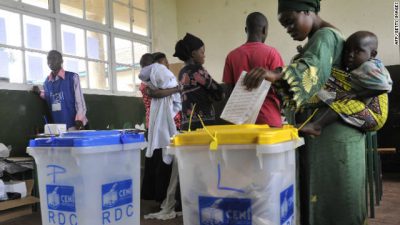By
Darell Maurice
2016 is expected to be the election year in the Democratic Republic of the Congo, but may actually pass by without this happening as Independent National Electoral Commission, CENI, appear unable to organize an election for November of this year.
Beyond financial constraints, there are also those of a technical nature. In this regard, “Technical notes with updating the electoral register and Distribution of Seats” are cited by this institution to support democracy, the subject of special attention on the part of users.
The element that makes one wince most however, the timing allocated for pre-election operations. Mathematically speaking, it takes between one year and eighteen months to update the electoral register, to enlist more than 40 million potential voters. This requires the availability of more than 53 million voter cards to over 61 million identification forms, more than 6,100 registration centers, more than 12,200 registration kits and over 30,500 officers enrollment. As for the budget to be allocated to these pre-election operations, it was valued at over 202 million US dollars.
Such seeminlgy unattainable figures suggest that there will be technical difficulties, despite the protests of some of the Congolese political class and civil society organizations who believe that it is possible to organize if the presidential and national elections are held in the same legislative year. Clearly, if the political will was there and if funding was acquired, 2016 could actually be an election year if the timetable announced by CENI after replacing Ngoy Mulunda’s team by that of the Abbe Apollinaire Malumalu that in 2013 had experienced a ‘normal’ performance.
Now everyone knows that CENI, due to its private financial resources, had to be content with the ‘minimum service’ until 2015, the year set for the holding of local elections, municipal and provincial. The drama in all this is that this support institution of democracy would have to start from scratch if the participants to the future political dialogue, who are busy making endless extensions, decided to start a new electoral calendar, incorporating the enrolment of all Congolese and Congolese women of voting age, the audit of the electoral register and the recomposition of its staff, etc.
Any delays should take into account a quoted 13 or 16 months for the updating of the electoral roll. Not to be too pessimistic, we note that the time limit to finalise any errors would be twelve months. And if we add the political turbulence and related legislation to underpin the electoral process, the electoral cycle could easily ‘slide’ beyond 24 months or more.
It’s certainly hard to accept but the margin of error is required for the Congolese electoral process that has for the last year been treading water. The Congolese should also avoid wishing for elections in 2016. All political parameters (uncertain dialogue), technical (new electoral calendar, voter registration), financial (hypothetical electoral budget) indicate that no election can be organized in eleven months. This seems especially true as stakeholders do not seem at all pressed to do what is necessary. As for the anti-dialogue, the ability to move the lines in the direction of the elections is so minimal that they are forced to wait for further developments. On the side of the international community, the option that seems to prevail is that of letting the Congolese themselves share the need to sit down together to find a way out of this political crisis.



Excellent site. Plenty of useful information here. I'm sending it to some buddies ans additionally sharing in delicious. And certainly, thanks in your effort!